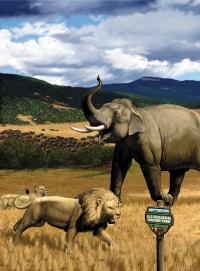
A long-term vision of Pleistocene Rewilding -- a massive Ecological History Park of North America with free-roaming elephants, lions and other large animals that went extinct 13,000 years ago. Dozens of megafauna (large animals over 100 pounds) – such as giant tortoises, horses, elephants, and cheetah – went extinct in North America 13,000 years ago during the end of the Pleistocene. As is the case today in Africa and Asia, these megafauna likely played keystone ecological roles via predation, herbivory, and other processes. What are the consequences of losing such important components of America's natural heritage?
In the November issue of The American Naturalist, a group of 12 ecologists and conservationists provide a detailed proposal for the restoration of North America's lost megafauna. Using the same species from different locales or closely related species as analogs, their project "Pleistocene Rewilding" is conceived as carefully managed experiments in an attempt to learn about and partially restore important natural processes to North American ecosystems that were present for millennia until humans played a significant role in their demise 13,000 years ago.
"Over the past 30 years, more and more evidence suggests that if we lose large animals from ecosystems, they often collapse and biodiversity, along with society, are the ultimate losers," says Josh Donlan (Cornell University). "For millions of years, large animals were the norm all over the world … we should start thinking about reintroducing these large animals and restoring these important processes back to ecosystems."
Starting with giant tortoises and wild horses, then moving toward lions and elephants, the authors provide a number of case studies for "Pleistocene Rewilding" and argue such introductions would contribute biological, economic, and cultural benefits to North America. The authors acknowledge that there are substantial risks and challenges; the risks of inaction may be even greater, however, including the continued global loss of megafauna. Source : University of Chicago Press Journals
 Print Article
Print Article Mail to a Friend
Mail to a Friend
